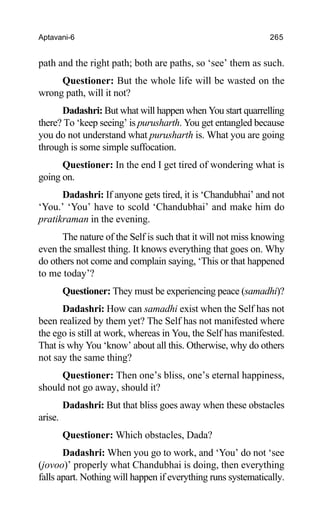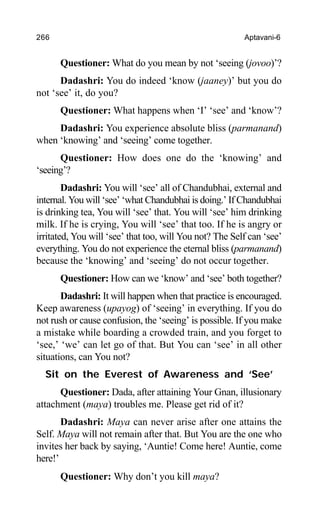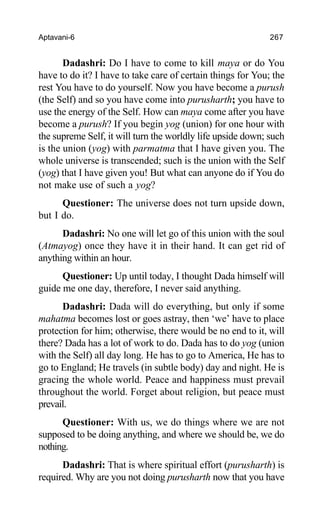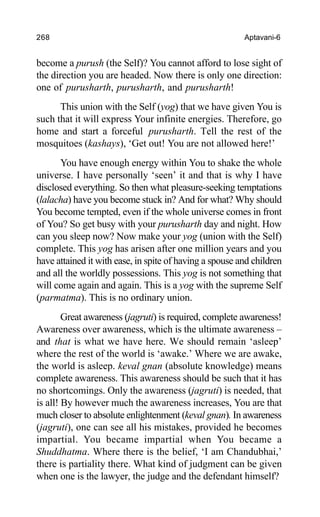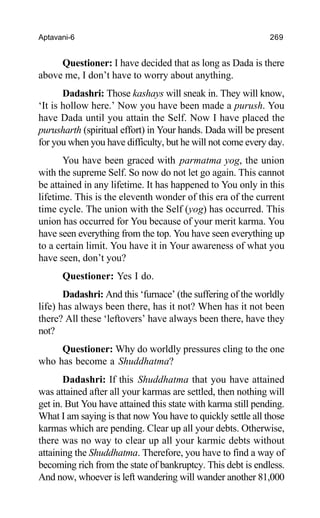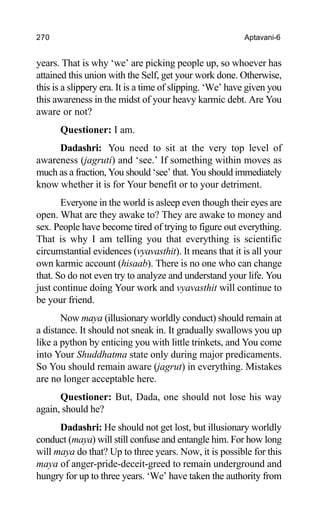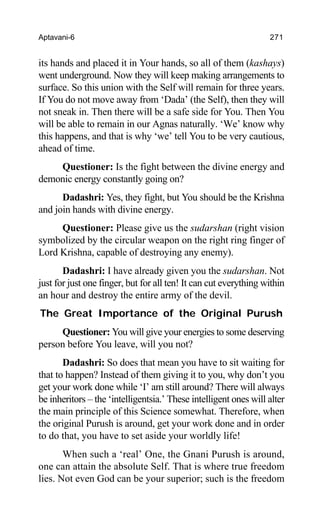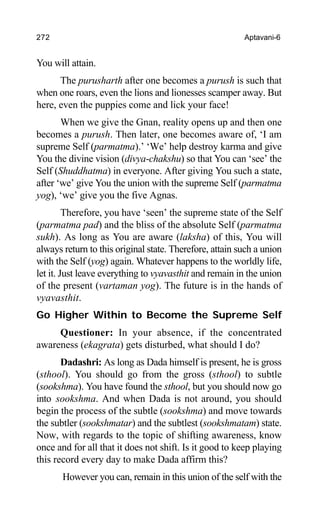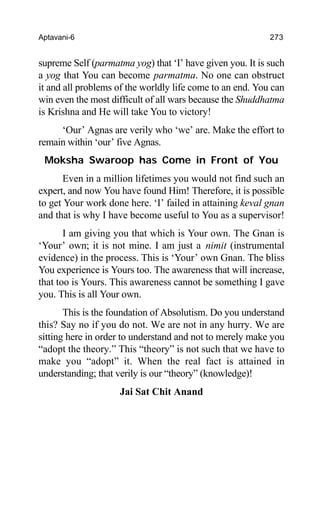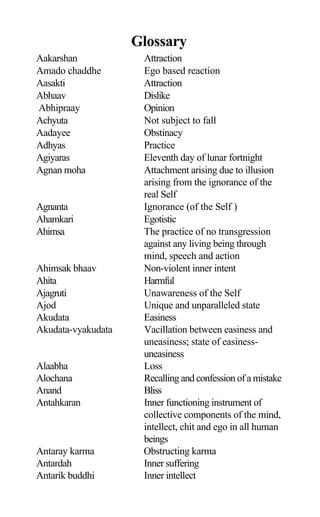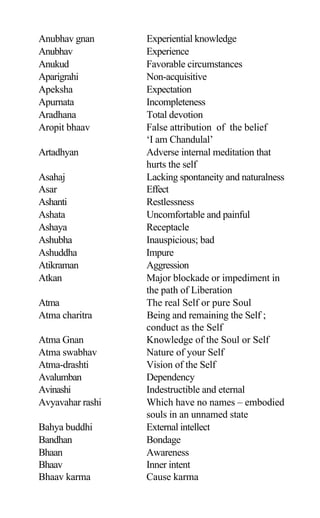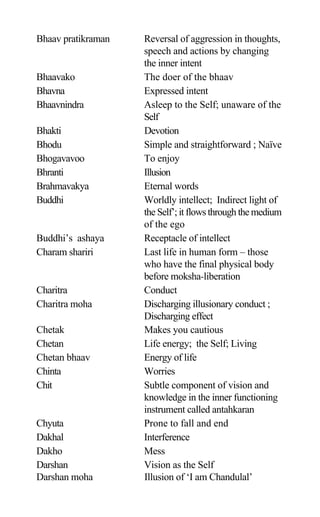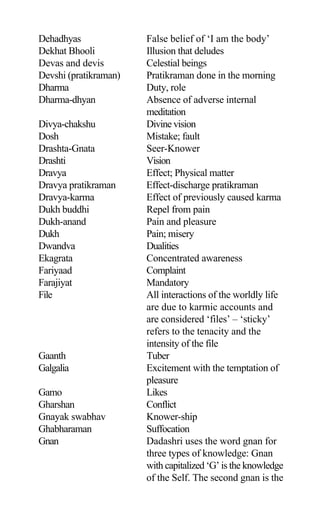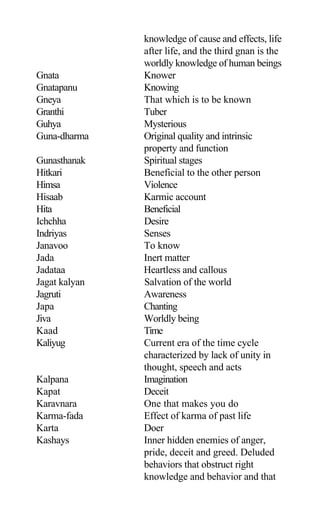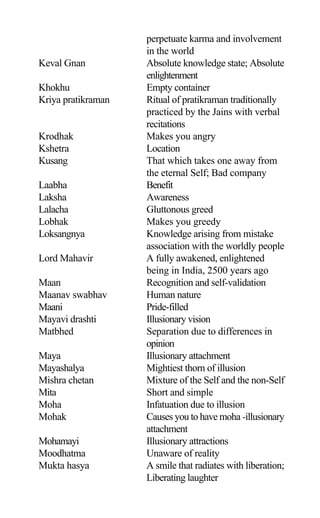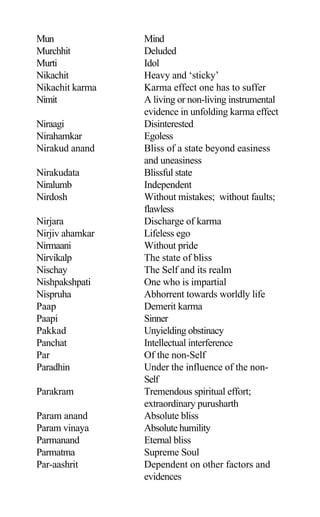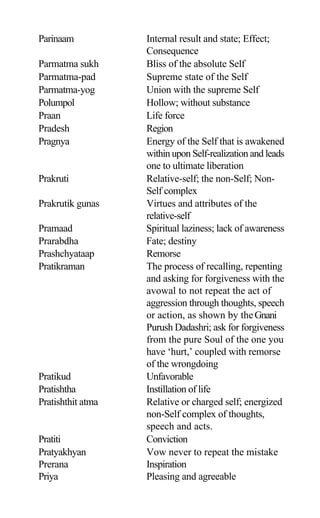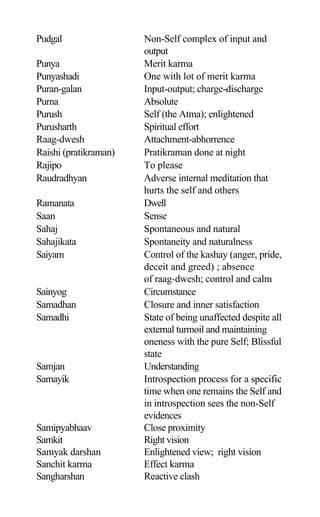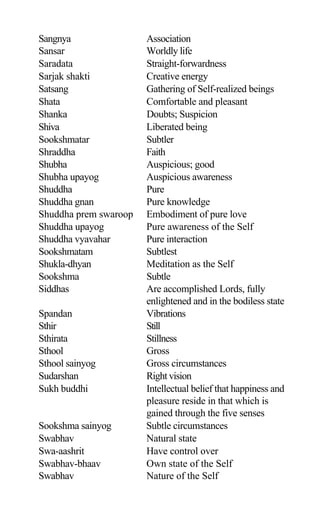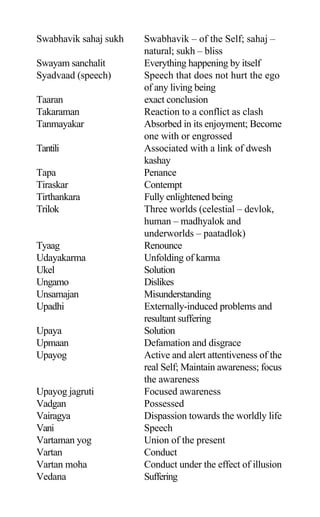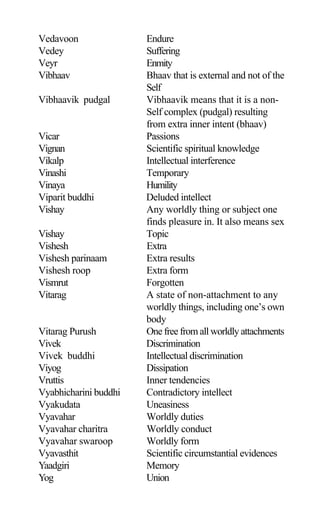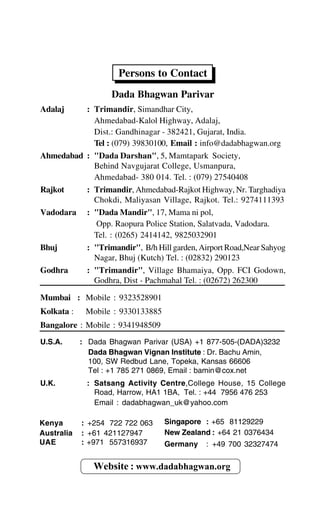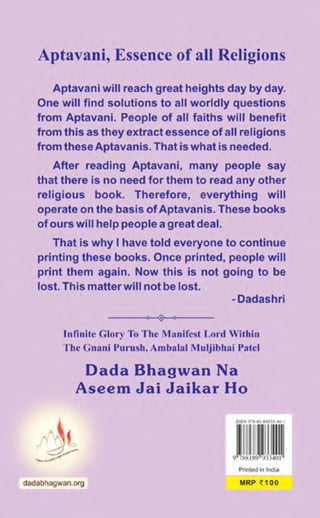The document discusses the teachings and impact of Ambalal M. Patel, known as Dadashri, who achieved spontaneous self-realization in 1958 and later developed the 'Akram Vignan' path to self-realization. He emphasized that true knowledge of the self can only be acquired through the guidance of a gnani (enlightened one) and not from books. The document also highlights the role of his successors, including Dr. Niruben Amin and Deepakbhai Desai, in continuing his mission of imparting self-realization to others.
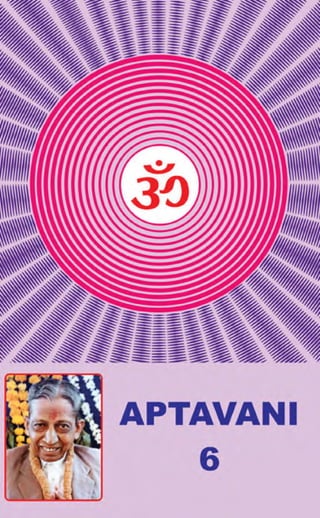
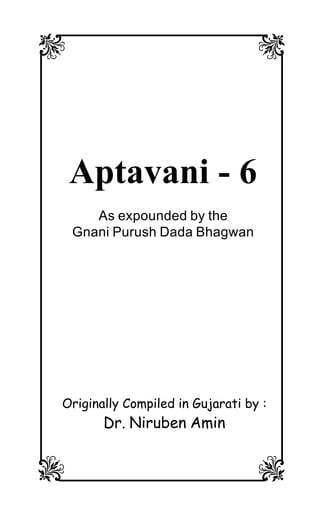
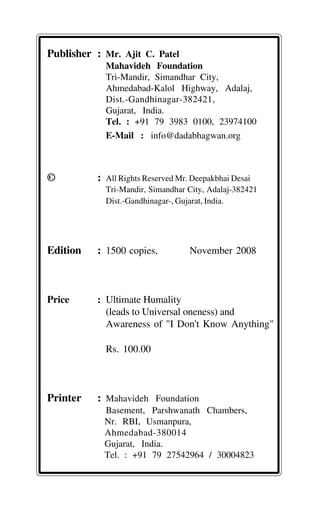
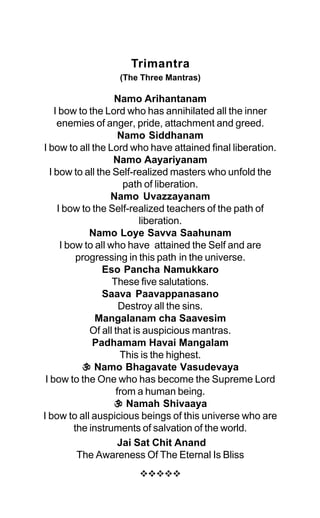
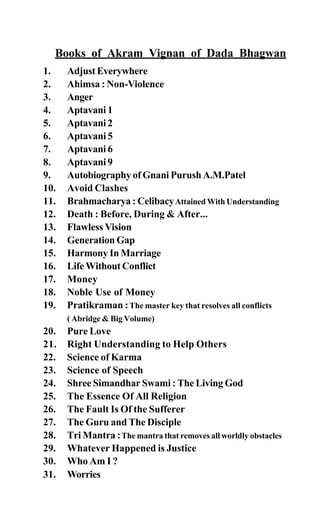
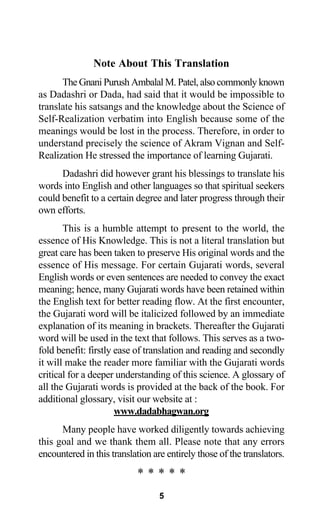
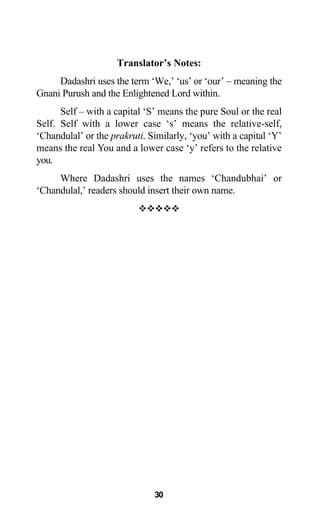
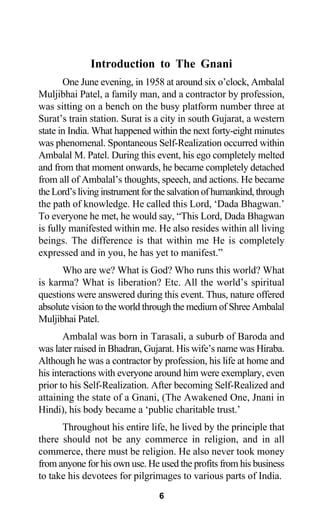
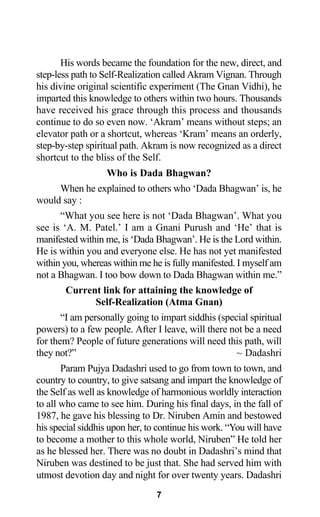
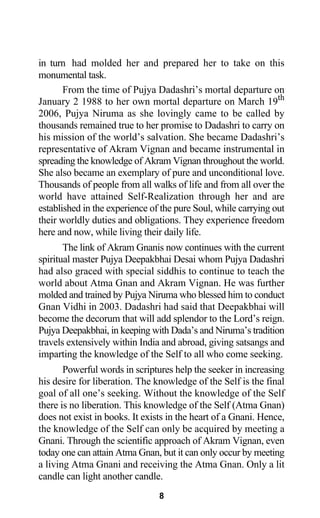
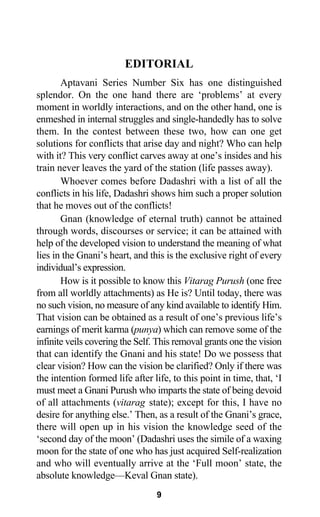
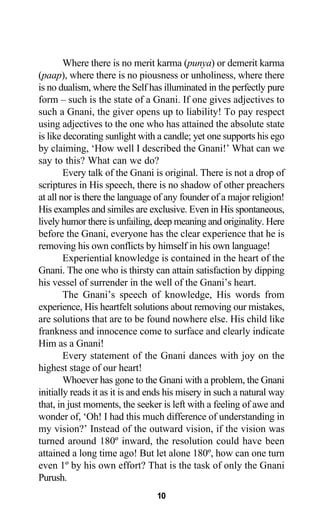
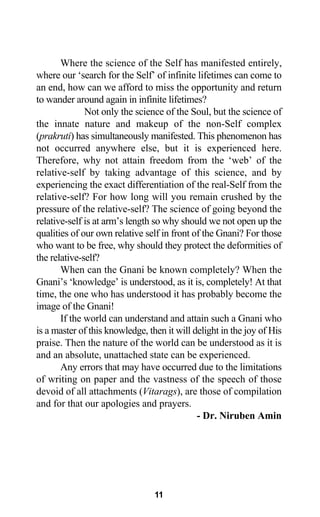
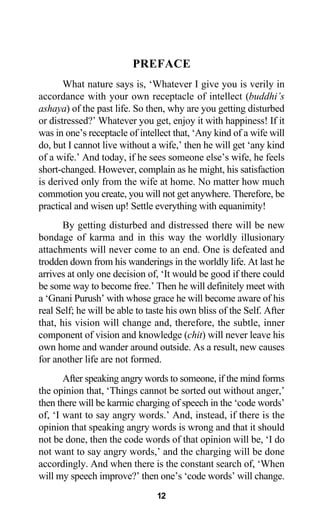
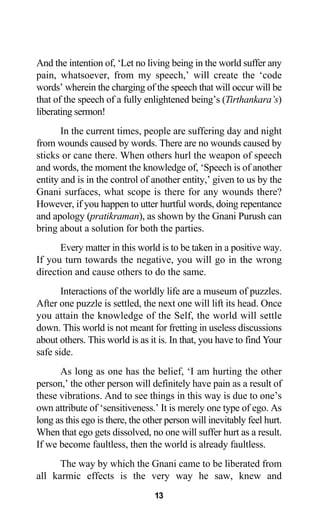
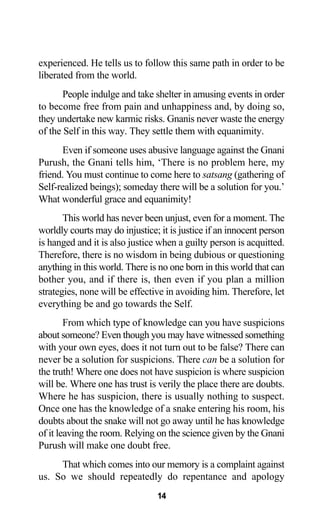
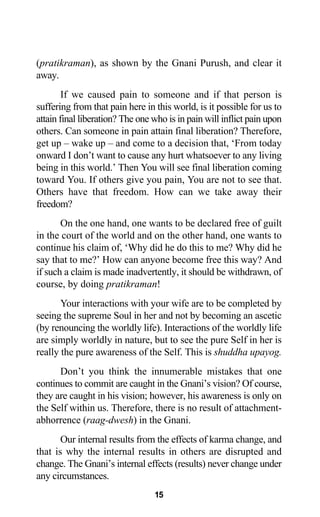
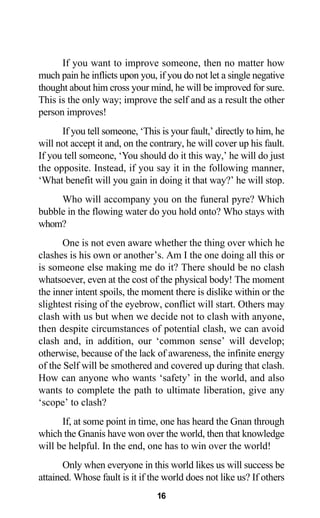
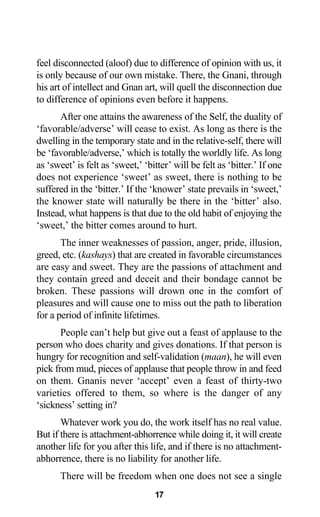
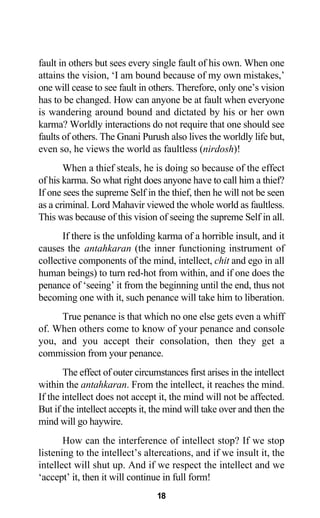
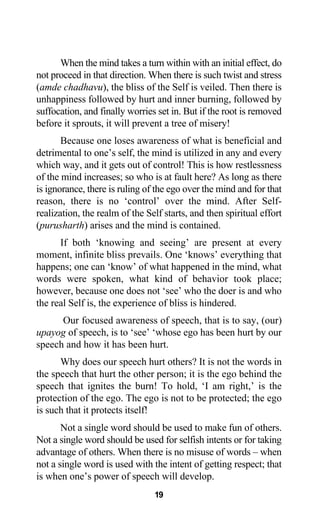
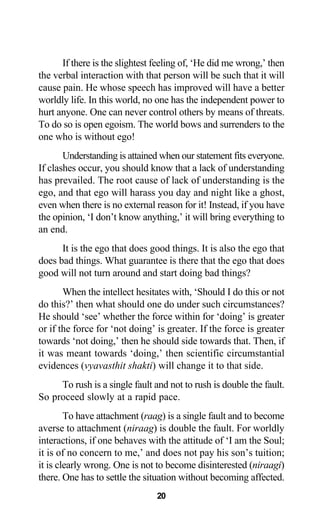
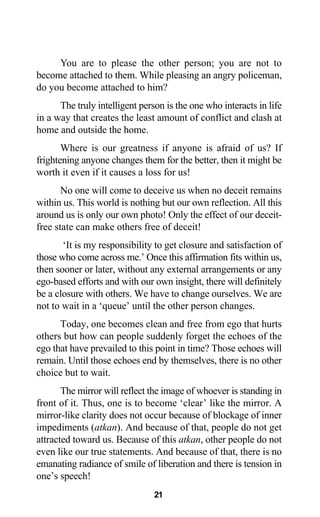
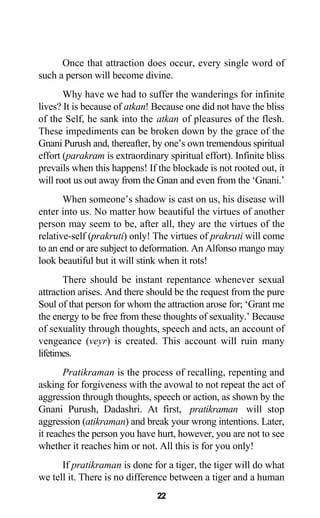
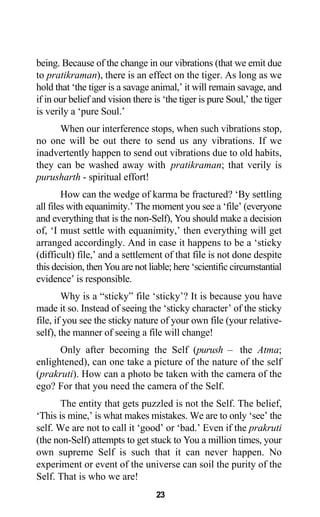
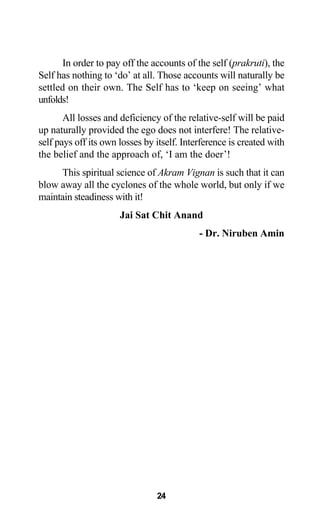
![Contents
[1]
The Instillation of Life 1
The Receptacle of the Intellect (Buddhi noh Ashaya) 2
Buddhi’s Ashaya and Bhaav (Inner Intent) 4
Support for Buddhi’s Ashaya 8
Nature and Buddhi’s Ashaya 11
Buddhi’s Ashaya of the Ultimate Kind 12
The Doer of Pratishtha is Under External Control 12
Even Ego is a Natural Arrangement 14
Location According to Ashaya 15
Idol as a Result of Pratishtha 17
Who Contemplates on the Soul? 17
[2]
Recording of Speech as Codes 19
Protection of the Ego 25
An Interfering Intellect Gives Rise to Clashes 27
[3]
Karma Bondage by Signature (Endorsement) 30
Penance Increases the Degrees of the Knowledge
as the Self 30
Pratikraman of the Akram Path and the Kramic Path 32
The Gnani’s Pratikraman 35
[4]
The Effect of Hurting Someone Creates Echoes 36
[5]
Entanglements of the Worldly Life 39
The Amazing Web of the Doer Within 39
Compassion and Equanimity of the Gnani Purush 40
There is No Closure for Suspicion (Shanka) 42
Who Joins You in the Funeral Pyre? 43
Only Gnan Can End Suspicion 45
The Precise Justice of Nature 46
One’s Own Vibrations Create One’s Wandering 47
[6]
The Court of Nature 49
25](https://image.slidesharecdn.com/aptavani-06-210621102027/85/Aptavani-6-Part-2-27-320.jpg)
![Counter-vibrations for Hurting Someone 50
Memory Event is Bondage 52
Repentance from the Heart 54
Clearing the Mistake 56
[7]
The Self is the Light that Never Gets Stained, Even When
there is Oneness with the Prakruti, the Relative Self 60
The Test/Examination of Vyavasthit 63
[8]
The Initial Culprit is the Intellect 65
The Demarcation between the Intellect and Pragnya 66
The Nature of Ego 68
Qualities of a Self-realized Being 70
The Chain of Cause and Effect 71
In the State of Non-doership, there is No Bondage 72
Destiny and Vyavasthit 73
[9]
Beginning of Kashay 76
Can There Be Kashays in Favorable Circumstances? 78
The Foundation of Kashay is Ignorance 80
The Unique Beauty of Akram Vignan 80
Conviction, Awareness, Experience of the Self 81
The Illusion – Samipyabhaav 81
[10]
Pleasure-seeking Versus Attraction 83
Bhaavak and His Colors 86
Nirakud Anand – Bliss of a State Free of Agitation and
Bewilderment 87
Echoes of the Ego in the Worldly Life 89
The Results (Effects) are Not Under Your Control 90
[11]
The Seer-Knower 92
The Right Intellect and Pragnya 96
The Gnani’s Way of Looking at the Antahkaran 98
The Problem of Wavering in Decision-making 99
Raag and Niraag 100
26](https://image.slidesharecdn.com/aptavani-06-210621102027/85/Aptavani-6-Part-2-28-320.jpg)
![The Senses, Mind, Intellect, Ego and then the Self 101
Concentration Comes with Interest 104
[12]
Attributes of the Non-self are Unreliable 106
The Consequences of Viradhana of the Gnani Purush 107
Key to Pleasing the Gnani 108
[13]
Spiritual Development through Conflicts: Not Reacting to
Conflict Increases the Energies Within 110
[14]
Seeing the Circumstances as They Are 118
Take the Beating and Be Free 120
The Flawless World 121
Viewing the Mistakes through Upayog 123
[15]
Upayog: Levels of Awareness 124
Pure Awareness in Worldly Life 126
Focused Awareness is Upayog 128
[16]
Understanding Moha, the Illusion 133
[17]
The Science of Karma 139
Equanimity is Not Reacting to the Unfolding
Karma Effect 140
The Internal Evidences Create the Result 142
The Difference between Bhaav and Desire 143
Do You Get Upset if You Hear Insults
Recorded on a Tape? 145
No Binding of Karma while Doing Karma 145
Karma is Not the Obstacle to Liberation 146
[18]
Sahaj Prakruti 148
More Details on Naturalness, Sahajata 150
From Sahaj to Asahaj to Sahaj 151
An Effortless State 152
Sahaj Means the Effortless State 153
Analysis of the Prakruti 154
27](https://image.slidesharecdn.com/aptavani-06-210621102027/85/Aptavani-6-Part-2-29-320.jpg)
![Control of Prakruti is with Vyavasthit 156
The Hassle and Difficulties from the Prakruti 156
Free Yourself from All Your Past Life Agreements 159
[19]
Settling a File with Equanimity 161
Do Your Duties without the Intent to Hurt 163
[20]
The Flawless Vision 165
[21]
Equanimity with Sticky Files 172
Speech, Pleasant or Unpleasant, is an Effect 175
Speech Energy: Use and Abuse 176
The Gnani Purush Becomes a Disciple 177
The Worldly Life is a Drama 178
[22]
Where is the Pain in this Life for You? 180
Death and Eternal Life 184
Vyavasthit and Life after Life Account 188
Does One Take Precautions or Are They
Just Happening? 189
[23]
What is an Intelligent Person Like? 191
Do Not Interfere, Just ‘See’ 195
[24]
The Weakness of Anger 197
A Life without Conflict is the Path to Moksha 198
Kashays Bind Karma for Next Life 200
When the Illusion that Deludes (Dekhat Bhooli) Ends,
Suffering Ends 202
Charity without Inner Beggary for Fame 206
The Phenomenal Value of Pratikraman 207
Getting the Work Done Through the Prakruti 208
The Root Cause of Separation Due to Differences
in Opinion (Matbhed) 211
Do You Take Adjustment or do Pratikraman
When there is No Acceptable Solution? 212
28](https://image.slidesharecdn.com/aptavani-06-210621102027/85/Aptavani-6-Part-2-30-320.jpg)
![The Intent to Settle with Equanimity and Pratikraman 217
One More Life to Complete Liberation (Ekavtari) in the
Akram Path 218
[25]
This is Worth Knowing and Worshipping 220
To Dwell as the Self 222
[26]
The Effect of Karma Dissipated by Talking with
Chandulal 226
Samayik in Front of the Mirror 228
Talking with and Correcting the Self in the Mirror 229
After Self-realization, One is Neither a Female
nor a Male 232
The Influence of Wrong Company 233
[27]
Atkan: Major Blockade in the Path of Liberation 235
The Gnani Purush Removes Atkan 236
Atkan is so Deluding that it Blocks Bliss and Liberation 238
Atkan versus Heavy Karma 239
Purusharth and Parakram 240
Extraordinary Inner War against Atkan 243
The Biggest Atkan is that of Sex 246
Being Free from the Major Blockade (Atkan) of
Sexuality 247
Factory of Vengeance 250
Opinions Obstruct the Bliss Within 252
Do Penance without Paying a Commission 255
Premature Fruition of Karmas – Udirana 256
Parakram– Extraordinary Spiritual Effort 261
[28]
The Secret of the Bliss of the Self 264
Sit on the Everest of Awareness and ‘See’ 266
The Great Importance of the Original Purush 271
Go Higher Within to Become the Supreme Self 272
Moksha Swaroop has Come in Front of You 273
* * * * *
29](https://image.slidesharecdn.com/aptavani-06-210621102027/85/Aptavani-6-Part-2-31-320.jpg)
![148 Aptavani-6
[18]
Sahaj Prakruti
Questioner: What is the natural and spontaneous (sahaj)
relative-self (prakruti) of the Gnanis?
Dadashri: Prakruti is considered sahaj when you have
a thought and it does not cause an effect within.
Questioner: How and when does the prakruti become
sahaj?
Dadashri: If one does not interfere in charitra moha
(discharging karma effects, discharge moha), then the prakruti
begins to become natural. The Soul is verily natural. But when
prakruti becomes natural then moksha occurs. Women are
more natural and spontaneous than the men here. Foreigners are
more natural than women from this place (India) and these animals
and birds are even more natural than the foreigners.
Questioner: Is the naturalness of all these categories
associated with the Self-knowledge (Gnan) or with the ignorance
of the Self (agnan)?
Dadashri: Their naturalness is associated with agnan. It
is like the naturalness of these cows and buffaloes. The cow may
be jumpy and wild and may even charge you to strike with her
horns, and yet it is natural. ‘Natural’ means to become absorbed
in (tanmayakar). ‘Natural’ means to become one with the nature
of the prakruti and not interfere in it. Such naturalness is with
ignorance of the Self.
If we ever try to catch this cow’s calf, you will see painful](https://image.slidesharecdn.com/aptavani-06-210621102027/85/Aptavani-6-Part-2-32-320.jpg)
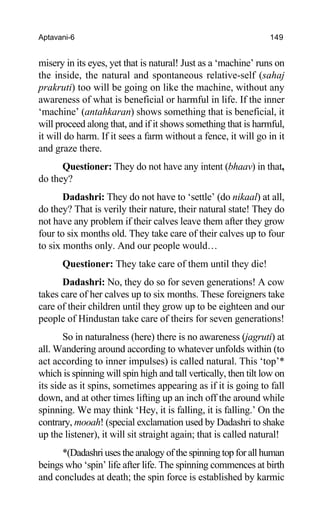
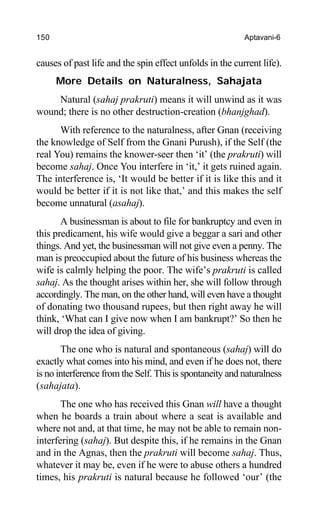
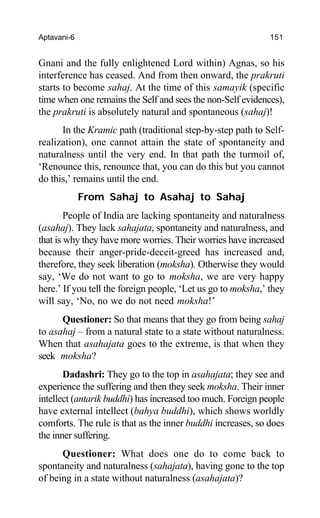
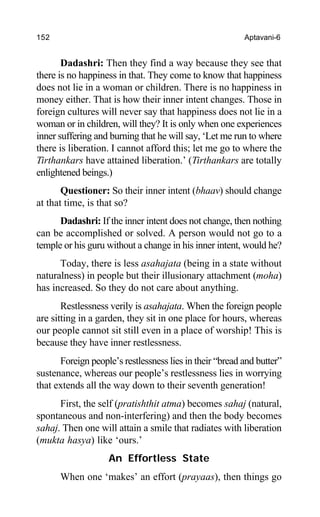
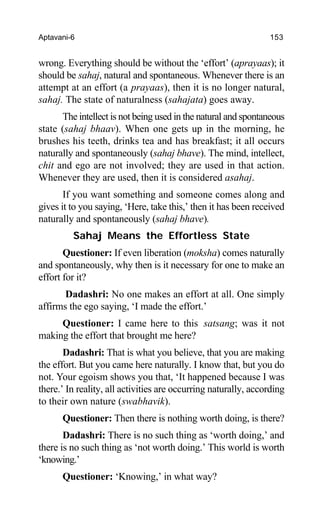
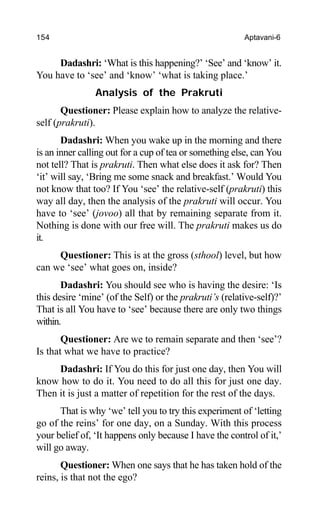
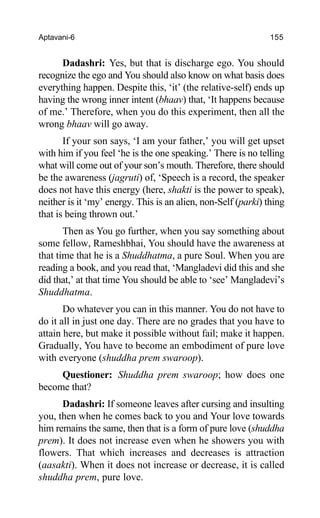
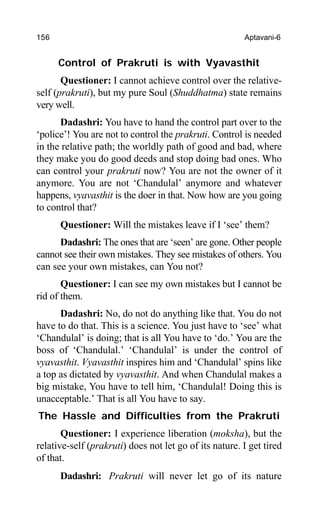
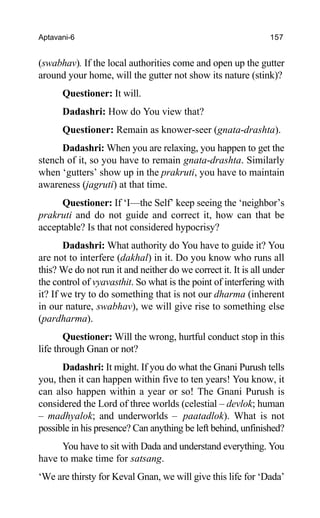
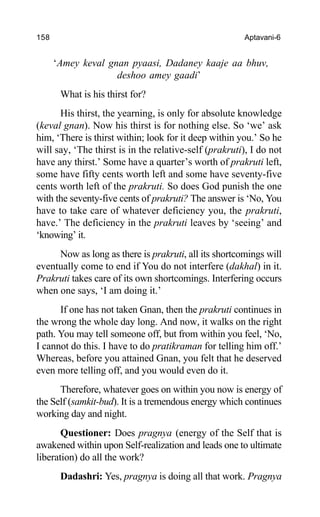
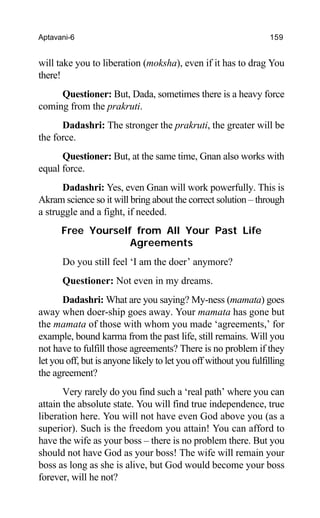
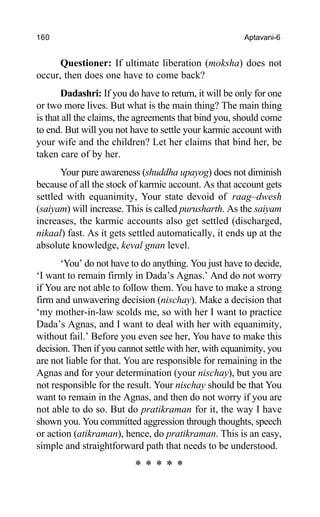
![Aptavani-6 161
[19]
Settling a File with Equanimity
Questioner: What is our duty, role (dharma) as human
beings?
Dadashri: Our dharma is to see how our mind, speech
and body can help people of the world. Run errands for others;
give others right understanding through your words, hurt no one
through mistakes; that is dharma. Do not hurt any living beings
(jiva). Take a vow to abstain from hurting all living beings; if this
is not possible, then take a vow to abstain from hurting human
beings. And if you have taken a vow to abstain from hurting
human beings, then take a vow, ‘Let no living being be hurt
through my mind, speech and body.’ This is all the dharma you
have to understand.
Otherwise, when one gets married, the mother-in-law gives
pain and misery (dukh) to the daughter-in-law and vice versa.
Thus they bind karma for a life in hell. If a woman is to become
a mother-in-law, she must first understand that she should get
her son married only if she is willing to lose her son, only if she
is willing to let go of him.
Has your ‘wishing well’ given results? Have your
expectations been fulfilled?
Questioner: After taking your Gnan, we feel that we too
should flow away just like the holy River Ganges.
Dadashri: Yes, You should flow without affecting (asar)
or hurting anyone. It is not possible to hurt anyone and attain the
ultimate liberation (moksha). If you hurt anyone, he will throw](https://image.slidesharecdn.com/aptavani-06-210621102027/85/Aptavani-6-Part-2-45-320.jpg)
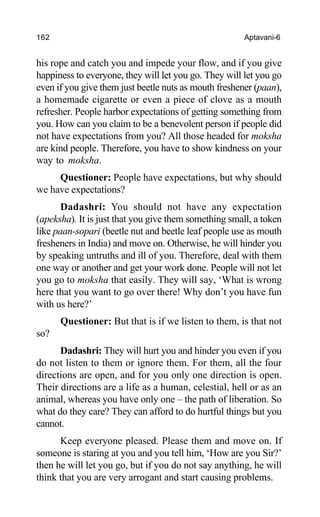
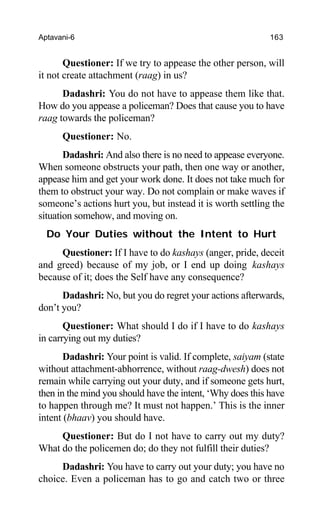
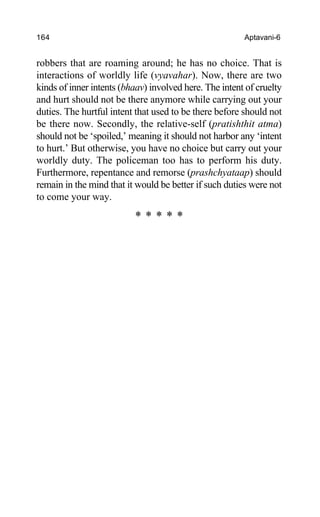
![Aptavani-6 165
[20]
The Flawless Vision
Questioner: Whenever I am interacting and conducting
myself in the worldly life, I have no understanding of whether ‘I
am Shuddhatma’ or ‘I am Chandulal.’
Dadashri: It is necessary for you to understand this; you
are ‘Chandulal’ and ‘You’ are also the pure Soul, Shuddhatma.
By the relative viewpoint, you are ‘Chandulal’ and by the real
viewpoint ‘You’ are ‘Shuddhatma.’ All that is relative is
temporary (vinashi) and prone to destruction. In the temporary
realm, you are Chandulal. All temporary interaction (vyavahar)
is Chandulal’s and the indestructible and eternal (avinashi)
interaction is Yours – the Self’s. Now, after attaining this Gnan,
Your awareness (jagruti) lies in the eternal.
If there is a lack of understanding, then sometimes one
can make mistakes like this; not everyone makes such mistakes.
You are not just Chandulal. When you are working for
someone, you are an employee there. Therefore, you have to
fulfill all your duties as an employee. No one is an employee
forever.
Questioner: There are so many transgressions towards
other living beings (atikraman) through thoughts, speech and
acts going on that I barely finish one task and another one is
ready and waiting. When trying to do pratikraman for one, the
force of the other is so strong that I have to keep the pratikraman
for the previous one pending.
Dadashri: They will unfold in huge numbers. When you](https://image.slidesharecdn.com/aptavani-06-210621102027/85/Aptavani-6-Part-2-49-320.jpg)
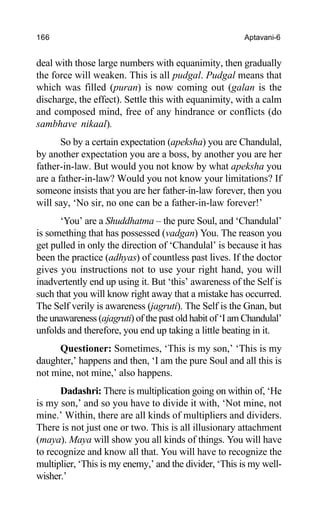
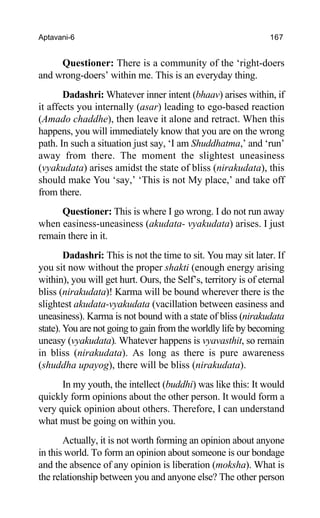
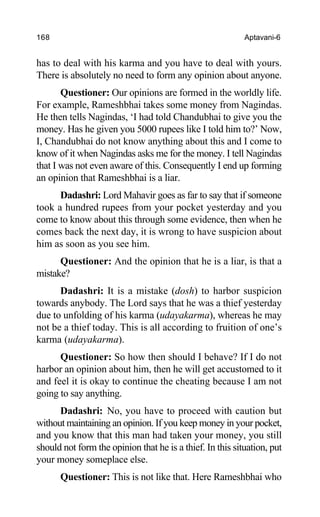
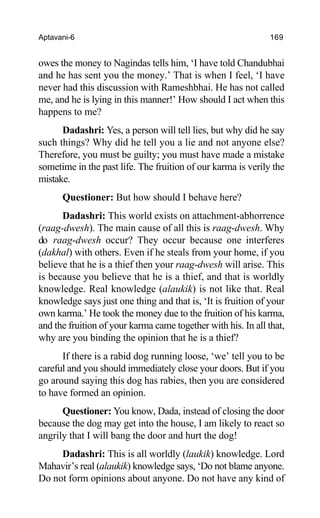
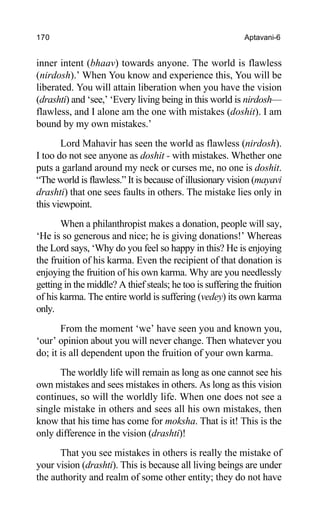
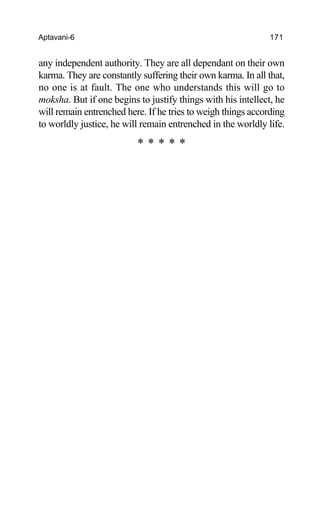
![172 Aptavani-6
[21]
Equanimity with Sticky Files
Questioner: Is ‘settling all files with equanimity’ the greatest
thing to do in the worldly life?
Dadashri: Yes, the problem is only with the files. You
have become stuck by these files only. The files are what obstruct
you, nothing else. Everywhere else you are free from attachment
and abhorrence (vitarag).
Questioner: What should I do if despite the intent of
wanting very much to settle with equanimity, I am not able to?
Dadashri: Yes, that can happen but you are not liable for
that. You have to make a decision that, ‘Even if things are not
settled with equanimity, I will never change my intent of wanting
to do so.’ You should never feel, ‘The Heck with it, I do not
want to bother settling with equanimity.’ Do not let go of Your
intent of, ‘I want to settle with equanimity, without fail.’ Whether
the settlement occurs with equanimity or not, is under the control
of vyavasthit.
Questioner: It may not be settled today but will it settle
for sure in two or three days?
Dadashri: Eighty percent of the time it gets settled on its
own. Only ten to fifteen percent do not get settled, and that is
because they (the files) are very sticky. But even then, You are
not liable for that; ‘vyavasthit’ is. You have decided that You
definitely want to settle with equanimity. All your efforts should
be towards settling files with equanimity.](https://image.slidesharecdn.com/aptavani-06-210621102027/85/Aptavani-6-Part-2-56-320.jpg)
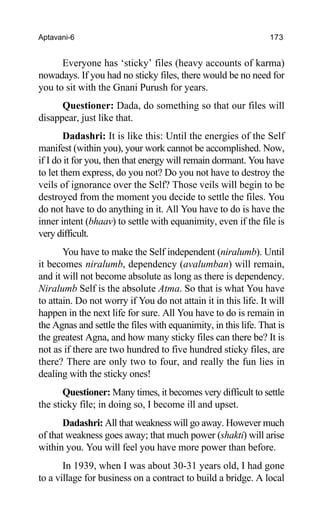
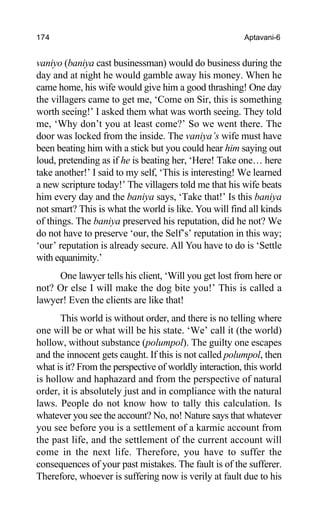
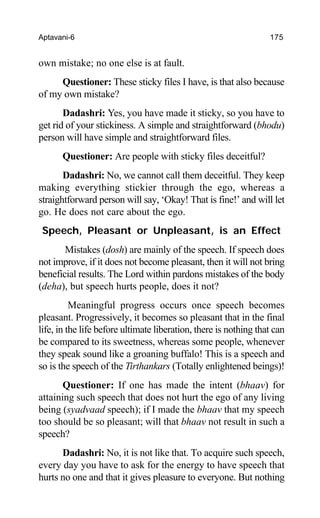
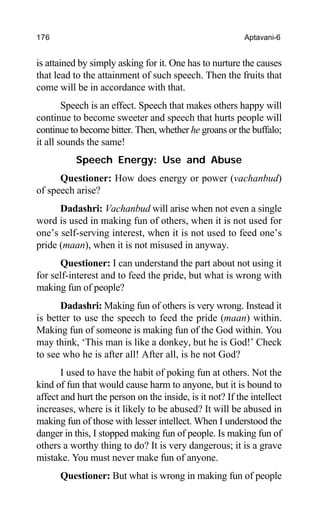
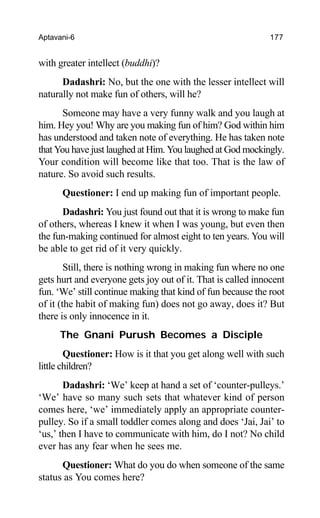
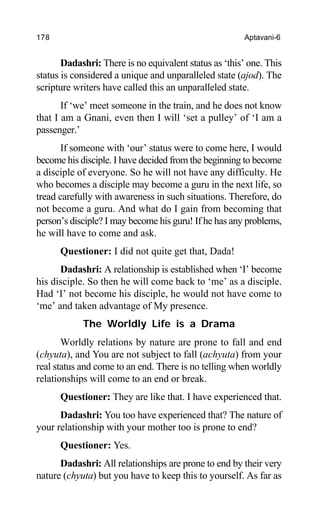
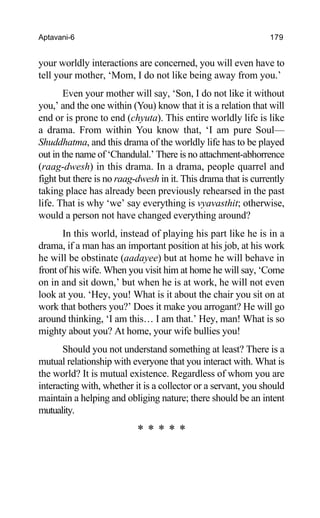
![180 Aptavani-6
[22]
Where is the Pain in this Life for You?
There is no pain (dukh) or misery in your worldly life.
Pain and misery are endured by patients in the hospitals when
they have to sleep with their legs suspended. Pain and misery
are in the severely burned patients. What pain (dukh) do you
have that you complain unnecessarily? You deserve to be thrown
in jail for six months! When you call good things bad, what will
you call ‘bad’? In the hospitals, where there is pain and misery,
call that pain and misery, but why do you claim pain where there
is none? In my whole life, I have never said that I have pain and
misery (dukh). How can you say that? Are you a fool to speak
this way? Pain worth two pennies, four pennies, eight pennies,
twelve pennies; can it all be called the same?
People sick in the hospitals have true pain, not you! People
have their legs in traction; people are suffering from burns; go
and see them. Then you will realize that your pain is nothing.
People have no awareness of how wonderful a place nature has
given them to live in. They criticize good things as well as those
which are not so good. Complaining and criticizing is their business.
How can you call this humanity? Should there not be some kind
of a limit as to what one can regard as difficulty? ‘Today I did
not have an appetite so I could not eat; today I have this difficulty.’
What kind of madness is this?
When my hip was fractured and it was suspended with
weights, some people said, ‘Why does God have to give you
this kind of pain and misery? For sure, now there is no God!’
Hey, you! Where has God hurt me? It seems that way to](https://image.slidesharecdn.com/aptavani-06-210621102027/85/Aptavani-6-Part-2-64-320.jpg)
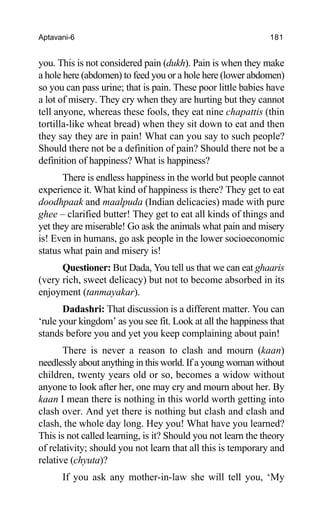
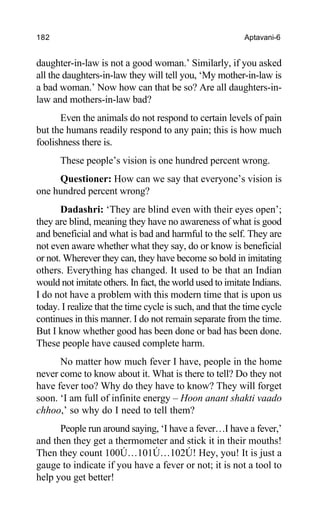
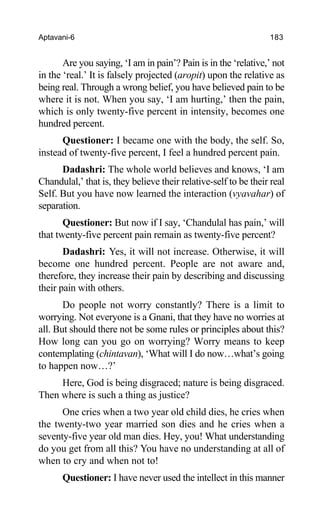
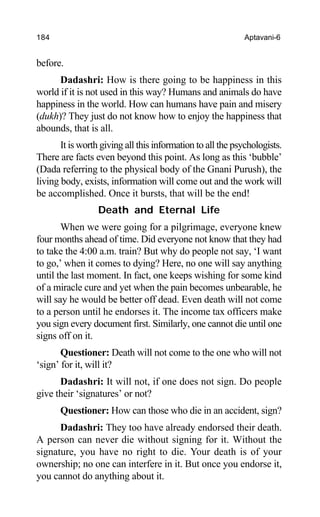
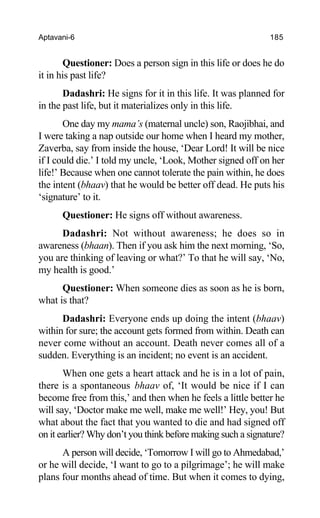
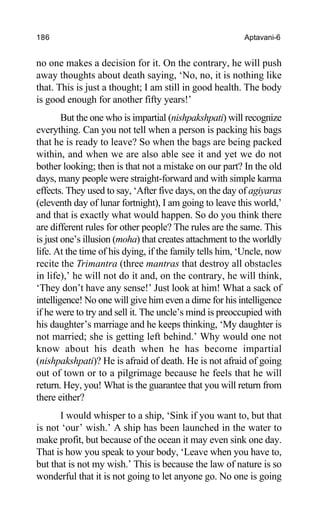
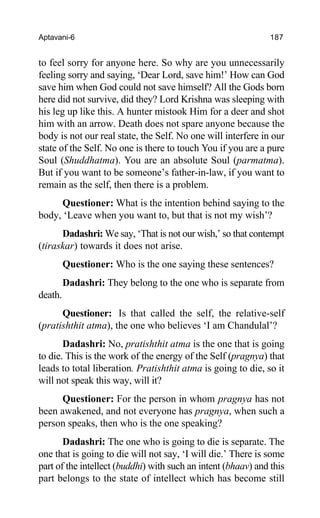
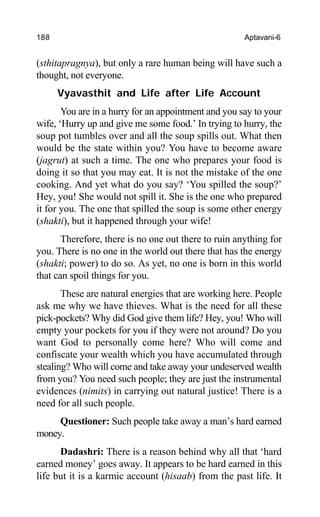
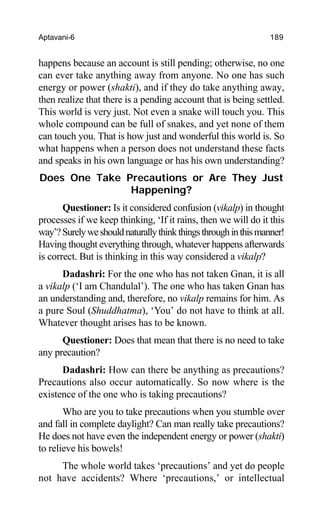
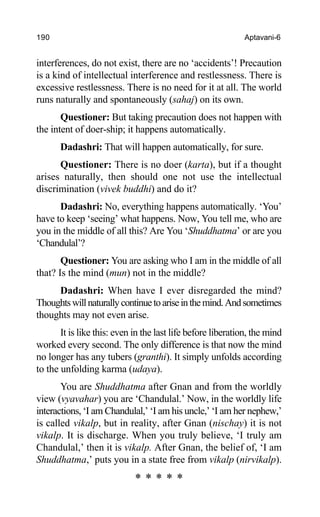
![Aptavani-6 191
[23]
What is an Intelligent Person Like?
Questioner: Who can be called intelligent?
Dadashri: The one who conducts his affairs in a manner
with the least clash in the home, in business or anywhere else is
called an intelligent person.
Otherwise, doing ‘panditai’ (the application of the
intellectual approach of scholars) to make the other person happy
is a form of ‘over-wiseness,’ meaning it is excessive use of the
intellect. Intellect should be used to help the other person.
If one drinks tea after eating a sweet desert and then
complains that there is no sugar in the tea, how can such a one
be called intelligent? And even if there is really no sugar in the
tea, there is no reason to fuss and make a scene. Why would
one want to yell and scare everyone at home over just a cup of
tea worth a quarter?
The one with intellect is the one who uses his intellect in
such a way that no one will experience any stress on his account.
If anyone ever experiences any stress and fear on his account,
then that intellect is wicked. Such wicked intellect binds terrible
demerit karma (paap). Therefore, one needs to understand the
role of intellect, does one not?
What good is the intellect that does not help anyone at
home and causes differences of opinion?
And a loss that occurs in business is the nature of doing
business, but a mistake must not occur in the process of mending](https://image.slidesharecdn.com/aptavani-06-210621102027/85/Aptavani-6-Part-2-75-320.jpg)
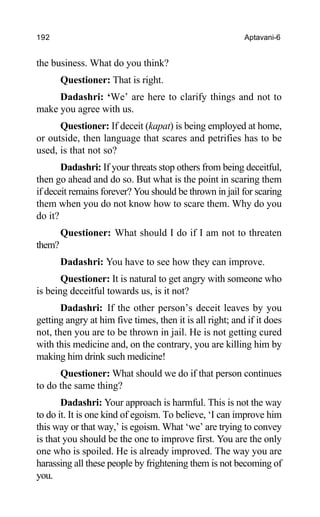
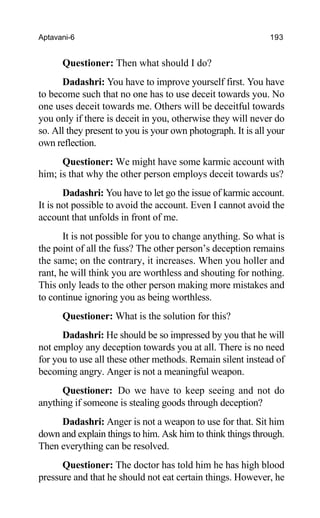
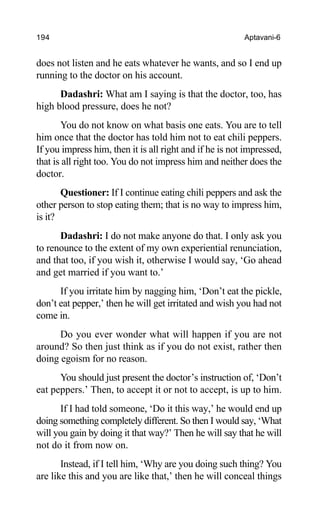
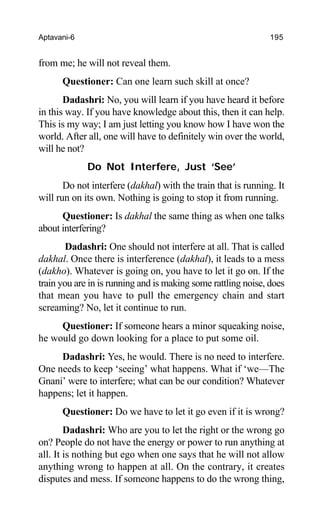
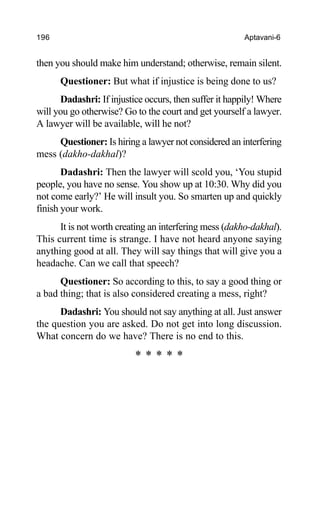
![Aptavani-6 197
[24]
The Weakness of Anger
Questioner: Should one suppress the anger that arises or
let it out?
Dadashri: Anger is not something that can be suppressed
even if one wants to. You can suppress it today, then tomorrow,
but what happens if you suppress a spring too much? One day,
it will recoil. For now, it is fine to suppress anger temporarily but
in the long run, it is harmful. Lord Mahavir has said to thoughtfully
analyze the anger. Mind you, it may take you many lifetimes to
think it through. One becomes angry even before he has time to
think about it. You can prevent anger only when you have the
awareness of your real Self. Such awareness arises only after
‘we’ give you this Gnan. Then anger-pride-deceit-greed will
come within a boundary. Awareness (jagruti) arises. Before
becoming angry, the awareness arises and shows you ‘who is at
fault’ and ‘what is the reality.’ You will understand all this and
so you will not become angry, will you?
Getting angry is tantamount to banging your head on a
wall. There is no difference between the two. These anger, pride,
deceit and greed are all considered weaknesses. The supreme
Soul (parmatma) manifests when these weaknesses go away.
These are veils of ignorance in the form of anger-pride-deceit-
greed. There are many prejudices. If you believe a person to be
a certain way, then you will see him that way all the time. One
is never the same forever. There is a change occurring every
second. The whole world is constantly changing.
If you try to get rid of these weaknesses of anger-pride-](https://image.slidesharecdn.com/aptavani-06-210621102027/85/Aptavani-6-Part-2-81-320.jpg)
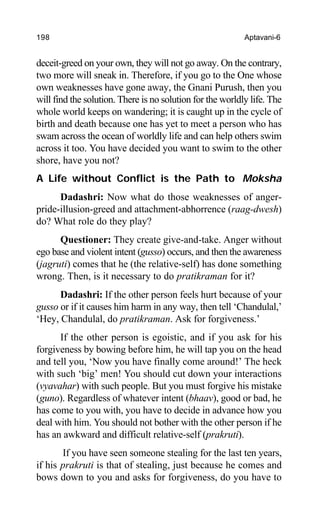
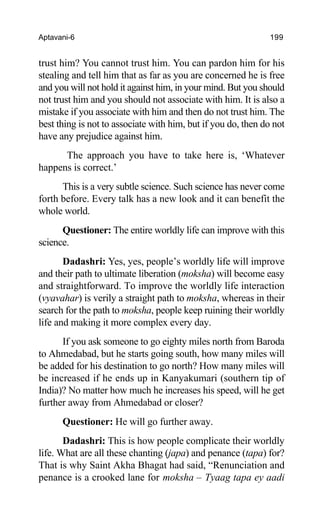
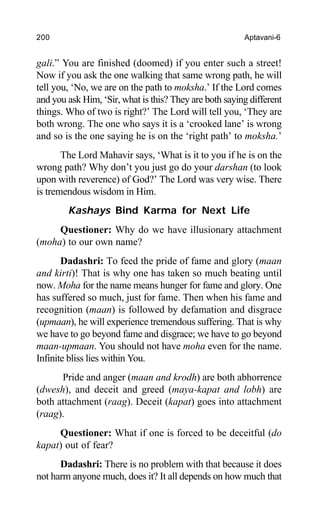
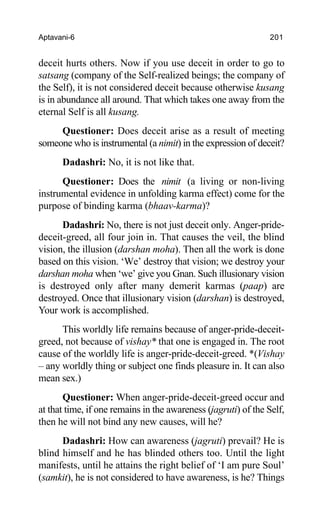
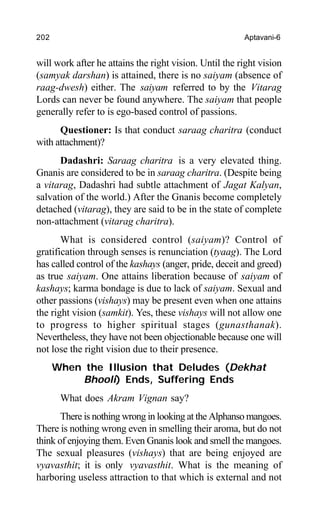
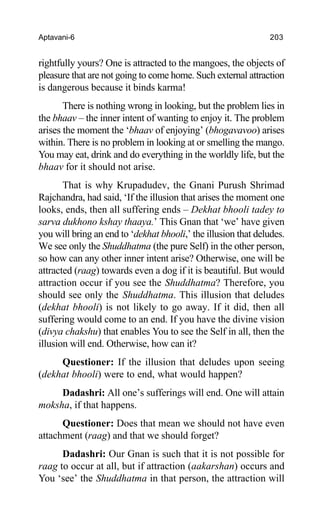
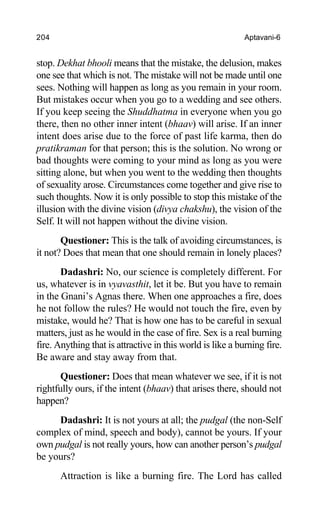
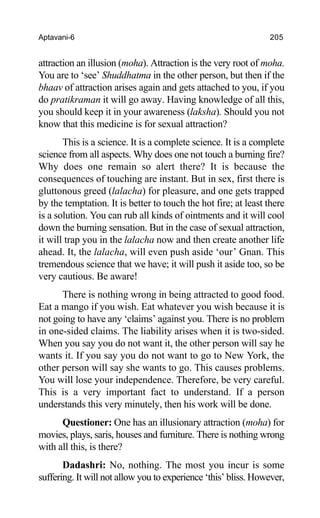
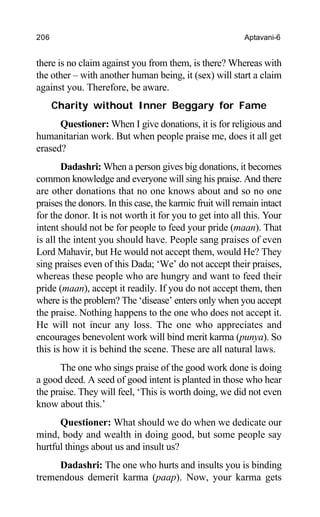
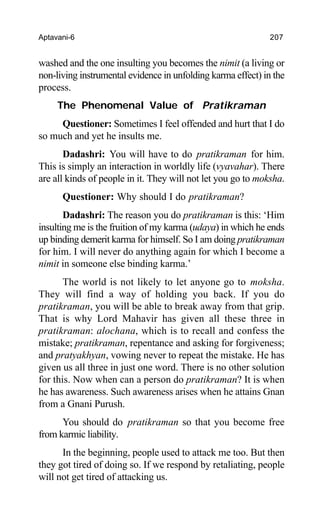
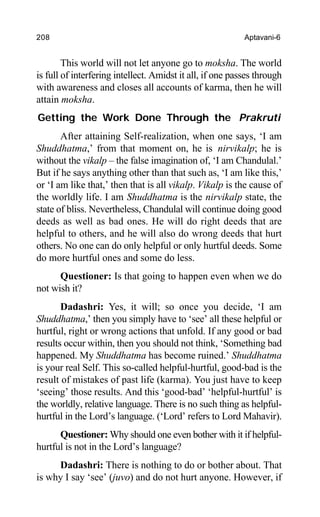
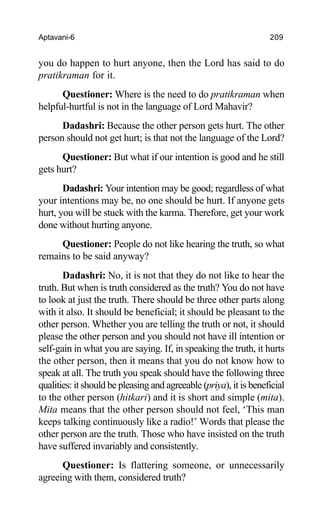
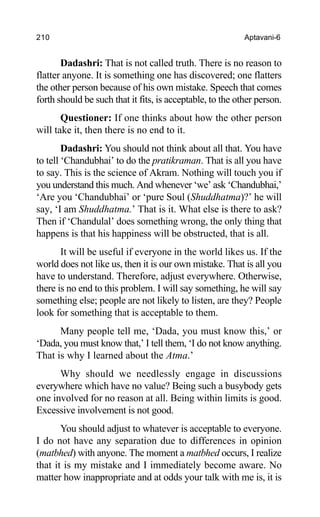
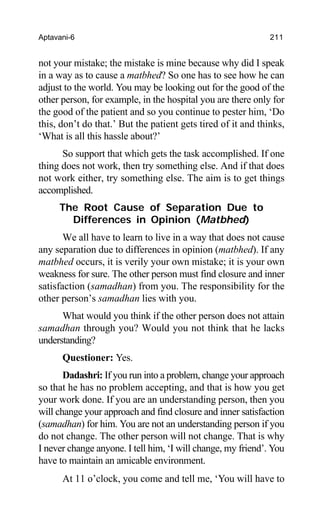
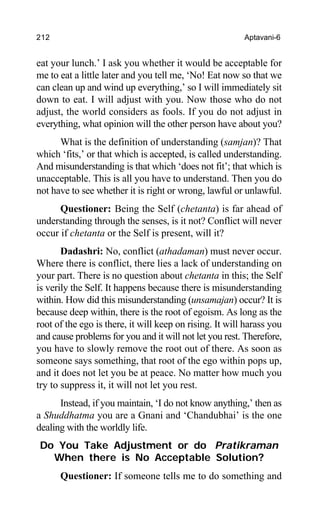
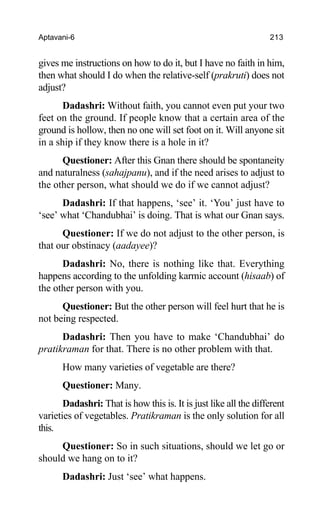
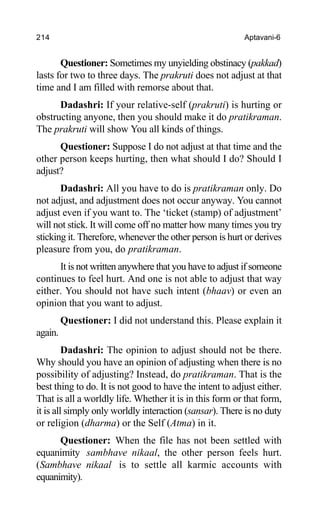
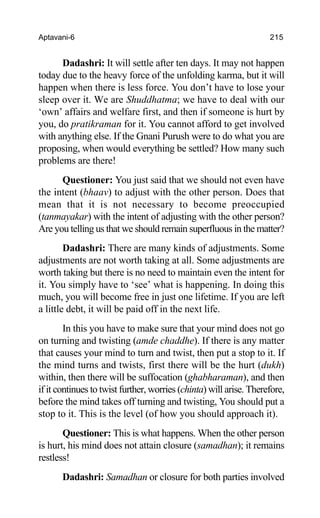
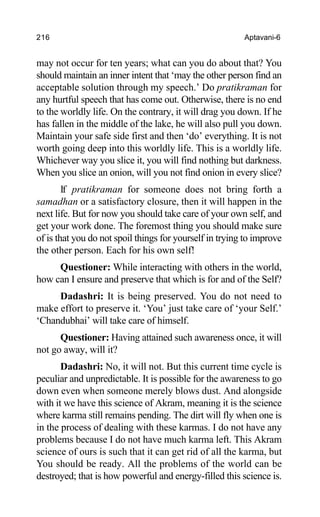
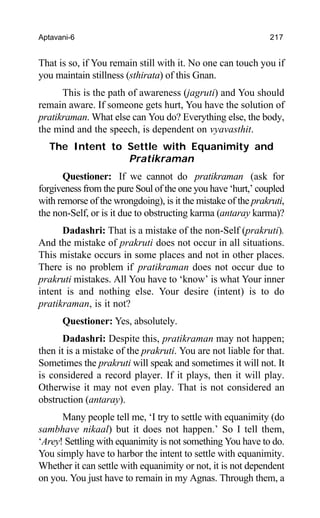
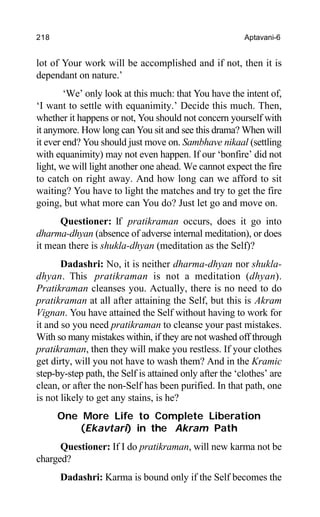
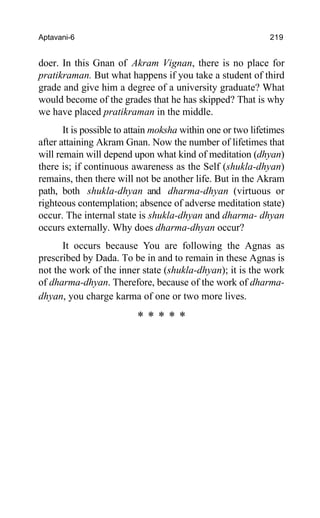
![220 Aptavani-6
[25]
This is Worth Knowing and Worshipping
Questioner: Now, when I ‘see’ the real, the kind of love
that should arise towards it does not arise, and the relative has
become a form of a cure. What is that called?
Dadashri: If love (here it means attachment/raag) arises,
then abhorrence (dwesh) will be there on the other side. There
is no need to ‘do’ raag. The Self is the only thing worth going
for with total devotion (aradhana), and that is the place to dwell
(ramanata). Dwelling in the pure Soul (Shuddhatma) means a
constant awareness, constant dhyan of Shuddhatma as the Self.
From now on, you have to dwell in the Self, be the Self (swa
is Self, ramanata is to dwell in). There is nothing else to be
done.
Questioner: We have to ‘know’ the ‘relative,’ the non-
Self, and we also have to ‘know’ the real, the Self?
Dadashri: No. You have to have total devotion
(aradhana) for the real, and You have to ‘know’ the relative.
Only the relative is worth ‘knowing.’ This ‘real,’ I have already
made you realize.
The whole world is that which is to be known (gneya),
and You are the knower (gnata). Your ‘knower-ship’ (gnayak
swabhav) has arisen. So what more remains now? Having
attained knower-ship, all You have to do is keep ‘seeing’ the
gneya.
There is no need for You to maintain love for Shuddhatma
because you have become that. Now who will you love? Gnan,](https://image.slidesharecdn.com/aptavani-06-210621102027/85/Aptavani-6-Part-2-104-320.jpg)
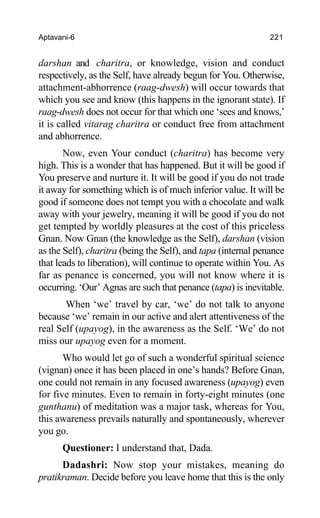
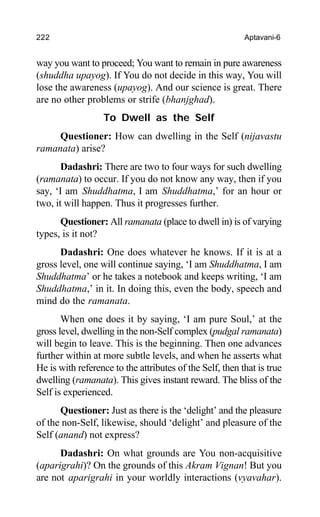
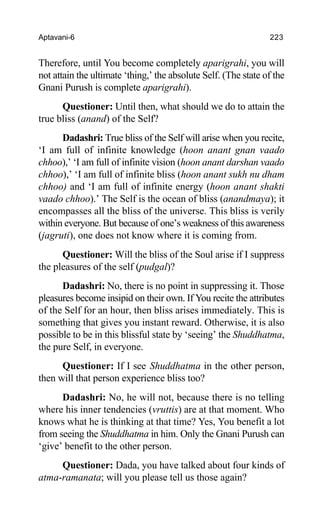
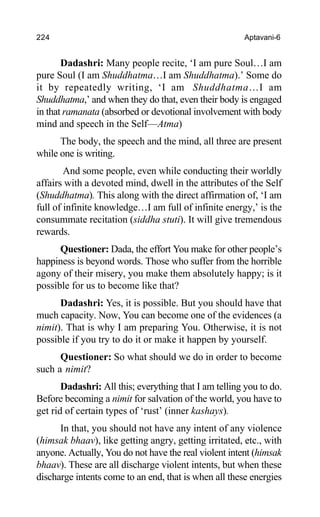
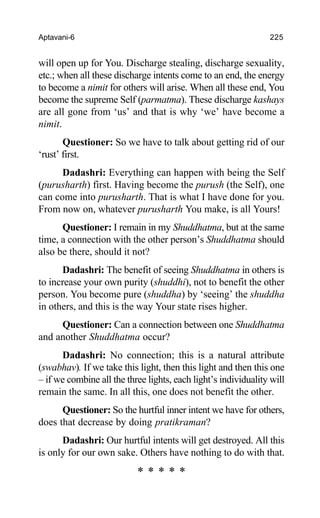
![226 Aptavani-6
[26]
The Effect of Karma Dissipated by Talking
with Chandulal
What remains after You attain the knowledge of the Self?
You are able to see the pure Self in everyone; you can also ‘see’
the pure Self within you. So then what else remains? The ‘wedge
of karma effect,’ that is, the impediment of karma effect remains.
You have become the supreme Self (parmatma) who ‘knows’
everything, but then what happens? The answer is that the ‘wedge’
of karma is the hindrance. How can this wedge be removed? It
can be removed by settling all files with equanimity.
The only solution to removing this wedge of karma effect
is to deal with all the files that present themselves before You
with equanimity, that is, without attachment-abhorrence (raag-
dwesh). The action of the karma is all being carried out by the
non-Self. You know, you might even end up slapping someone,
but there is no raag-dwesh there. Even before the file arrives,
You have made a decision that You want to deal with that file
with equanimity. The wedge of karma effect is due to your own
plan and design of past life. When that effect of karma comes
along, people become needlessly perplexed. Now You have
come to ‘know’ that ‘Chandubhai’ is the one getting perplexed.
Do You not become aware of that?
Is this wedge of karma the same for all or is it different?
It is different because everyone is different. Now if this old lady
tries to teach something to this young girl, how will she understand
her? ‘Dada’ will recognize the ‘wedge’ in the old lady and the
‘wedge’ in the young girl. ‘We’ can also tell how these](https://image.slidesharecdn.com/aptavani-06-210621102027/85/Aptavani-6-Part-2-110-320.jpg)
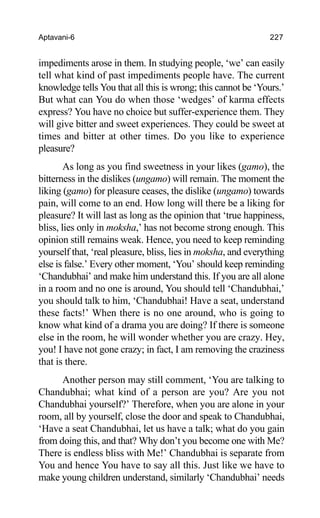
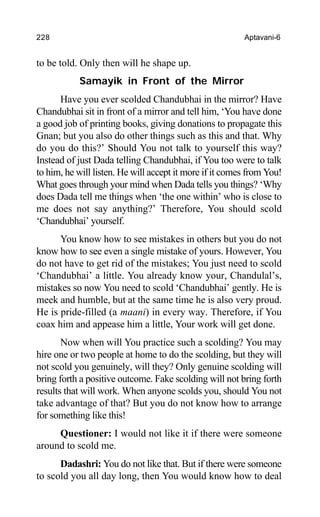
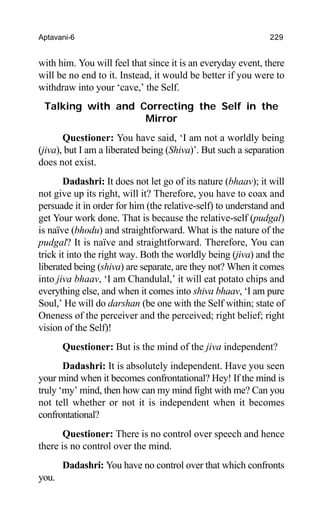
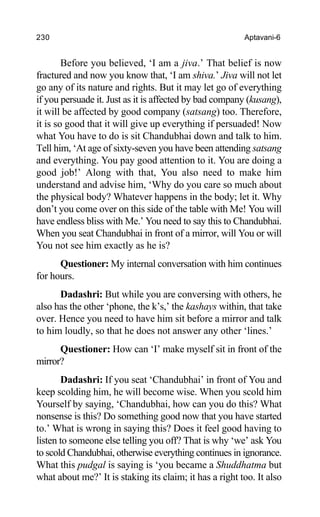
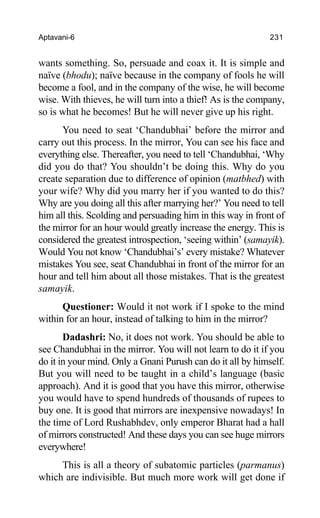
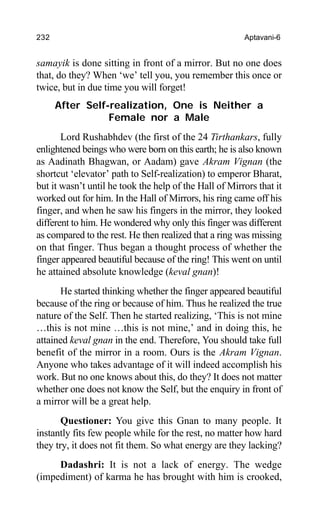
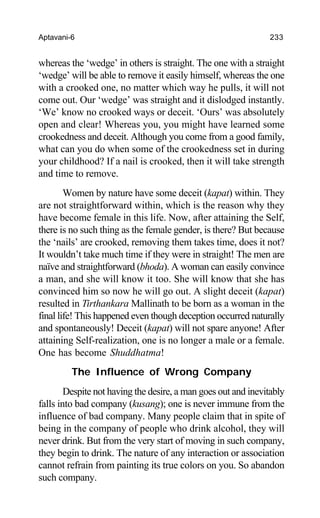
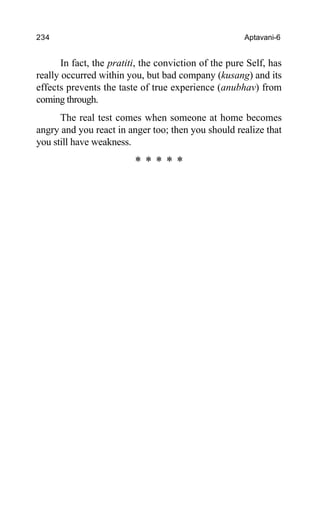
![Aptavani-6 235
[27]
Atkan: Major Blockade in the Path of Liberation
Dadashri: Do you ever experience excitement with the
temptation of pleasure (galgalia)?
Questioner: When Sunday comes and it is time for betting
on the horses, galgalia occur inside me.
Dadashri: Yes, why does that happen on a Sunday and
not on a Saturday? Only when matter (dravya), place (kshetra),
time (kaad) and intent (bhaav) come together do you experience
this excitement (galgalia).
Each person has been left dangling and stranded from
infinite past lives; each has been stranded in his own major inner
obstruction (atkan) which inevitably blocks spiritual progress.
One gets stuck in it. Why has one been stranded since time
immemorial? Why is there still no solution for it? It is because
one has some kind of atkan. Everyone has a different atkan.
Do you understand this atkan? A smart, care-free horse
pulling a carriage comes across a grave of a Muslim person
covered with a green cloth. The horse will stop as soon as it
sees the green cloth. Why is that? It sees the green cloth on the
grave and sees it as something new and gets startled. Then, no
matter how much the owner strikes it, it will not move forward.
Then he may have to strike, coax or put blinders on him and
take him across. But the next day, the horse will get stuck at the
same place. That is because there is an atkan (major blockade
of inner obstruction) within him. At that time he forgets everything;
he forgets who he is; he forgets his knowledge (gnan). If the](https://image.slidesharecdn.com/aptavani-06-210621102027/85/Aptavani-6-Part-2-119-320.jpg)
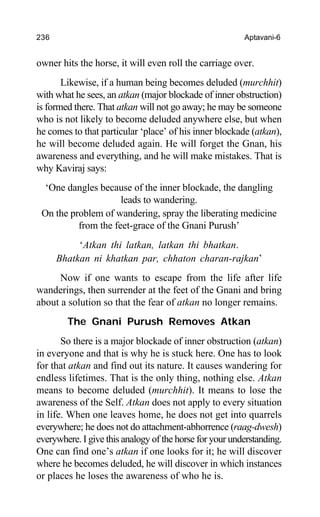
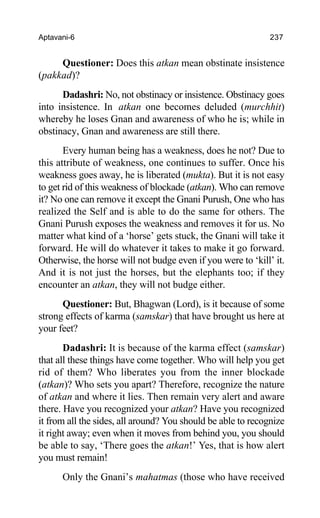
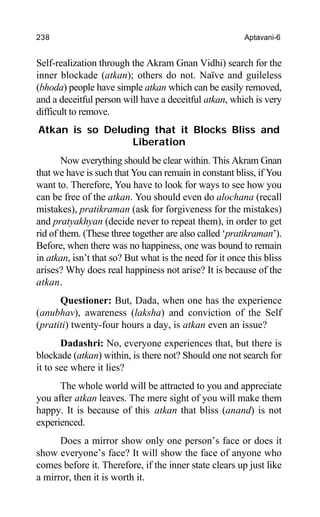
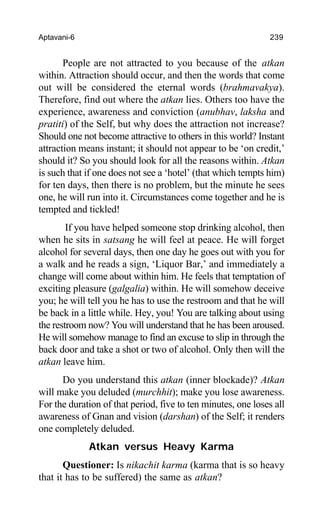
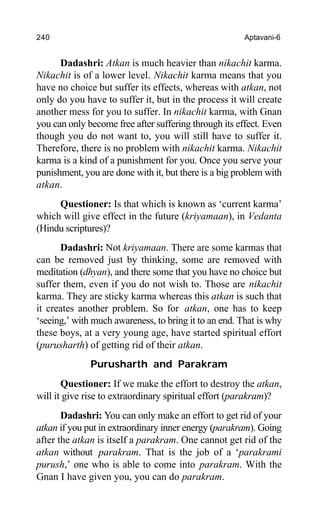
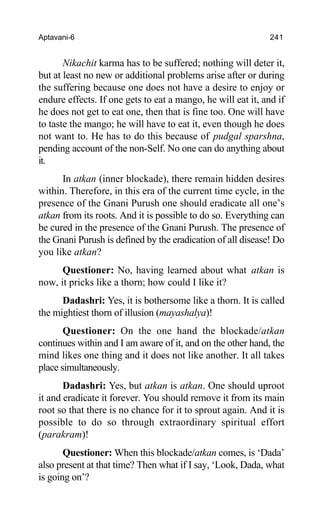
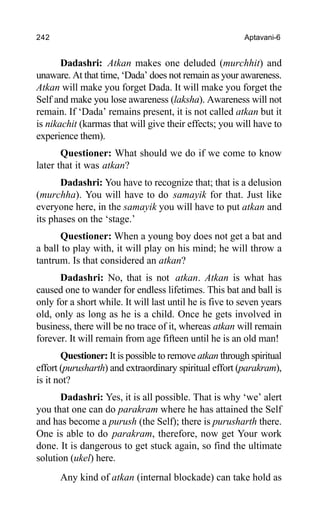
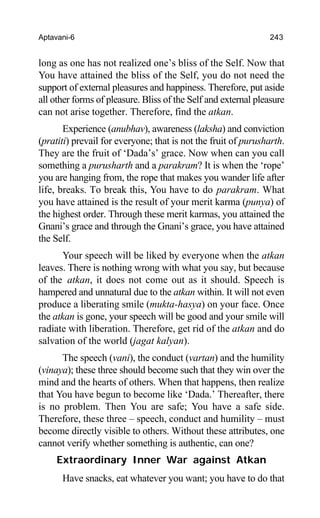
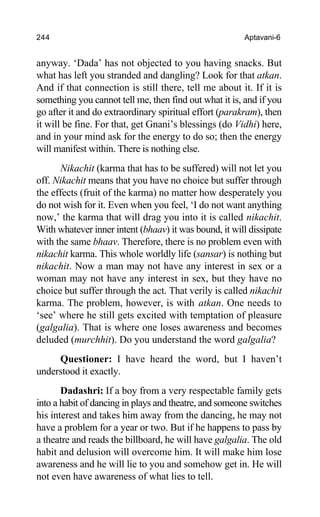
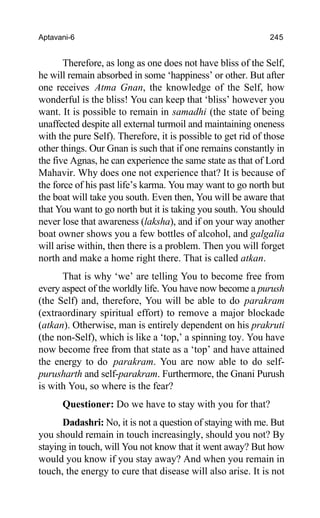
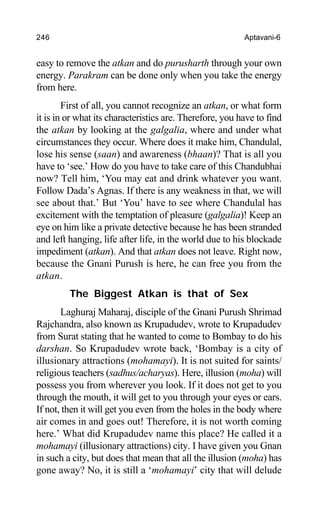
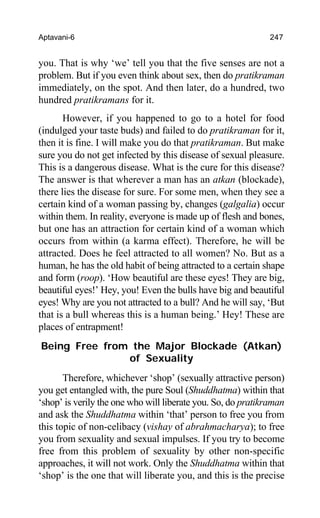
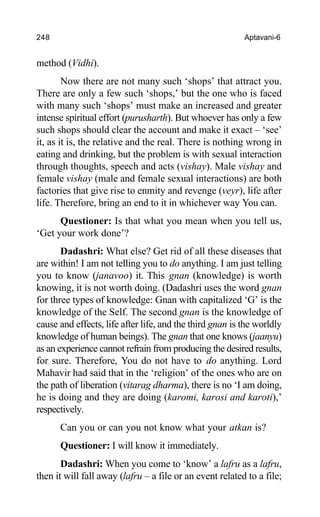
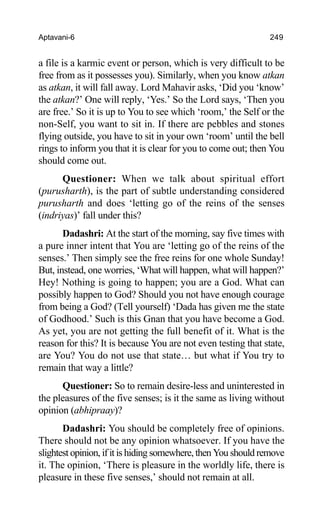
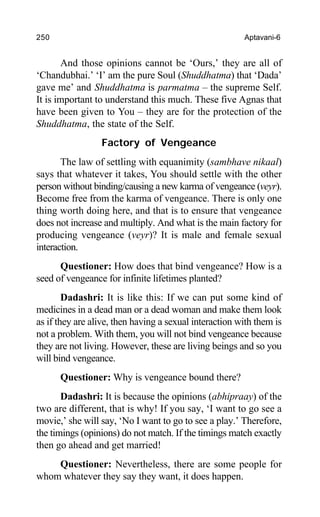
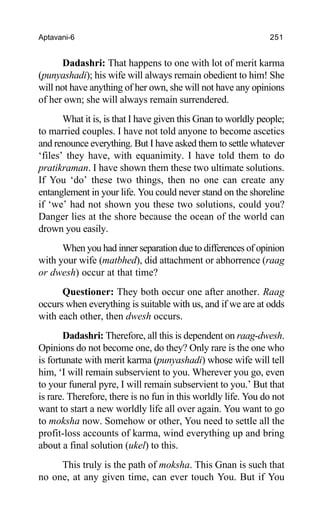
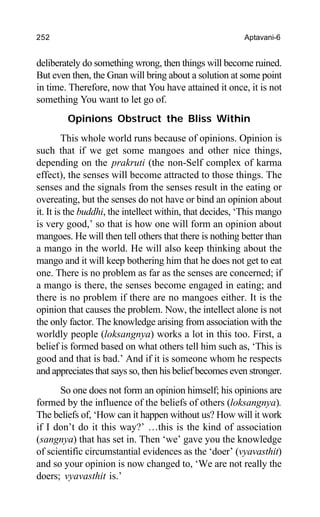
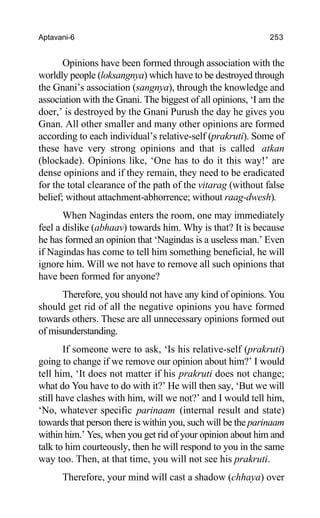
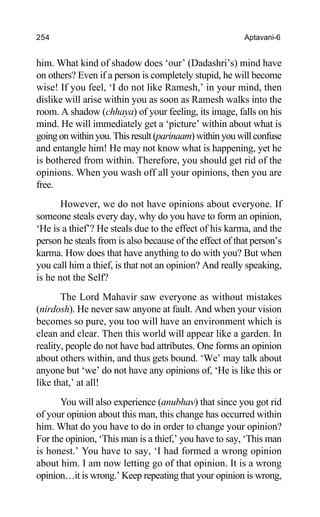
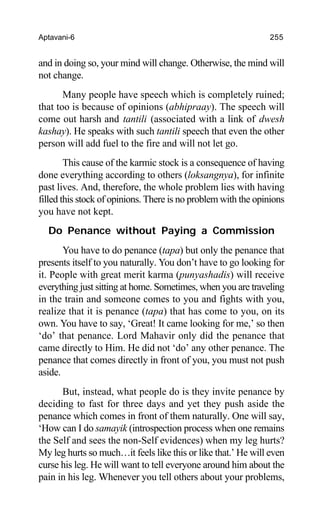
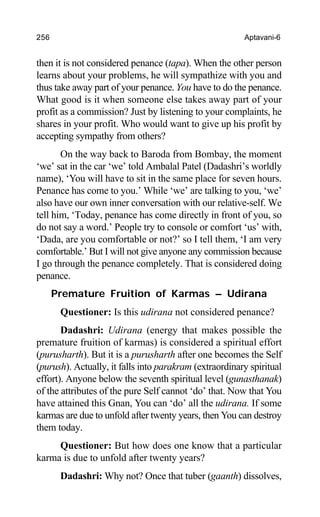
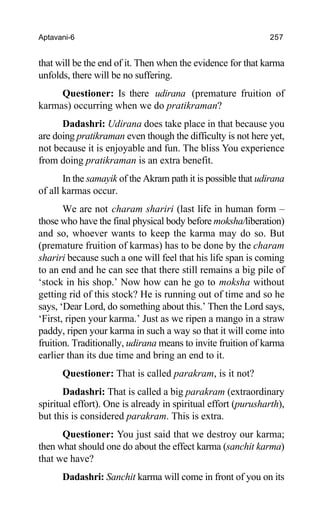
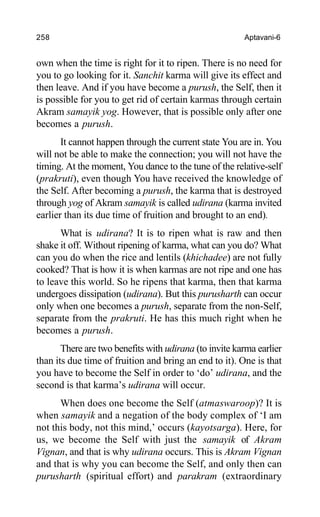
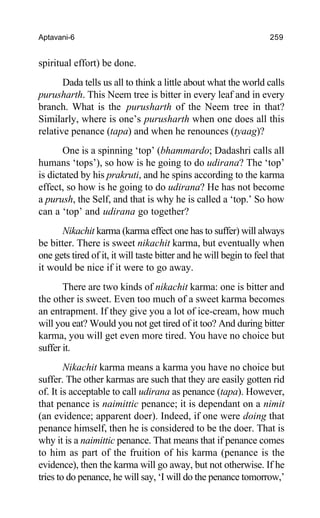
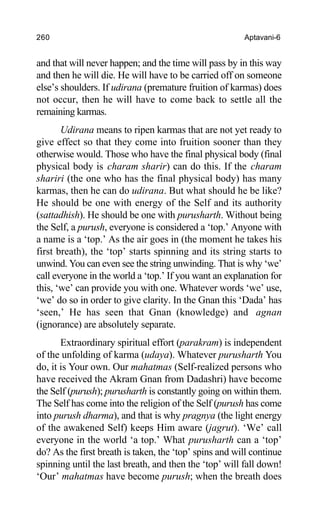
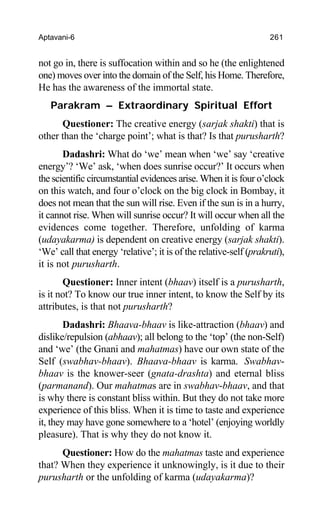
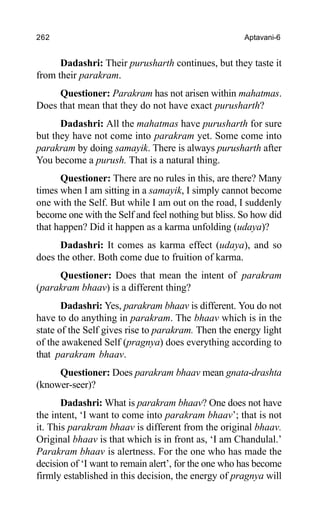
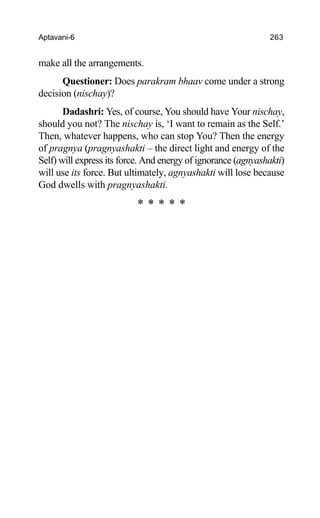
![264 Aptavani-6
[28]
The Secret of the Bliss of the Self
Questioner: There is constant awareness of Shuddhatma,
yet many times the mind becomes depressed. Why is that?
Dadashri: Our Gnan says just keep ‘seeing’ what is
happening to ‘Chandubhai.’ There is no other solution. Would
you not recognize that he has brought more garbage with him
from the past life?
Questioner: At that time, the relationship of that which is
to be known and the knower (gneya-gnata) does not remain.
The awareness, ‘I am separate from this mind, speech and body,’
does not remain.
Dadashri: If that gneya-gnata relationship did not prevail,
then You would not be able to know that this is happening to
Chandubhai. Who comes to know about this? Therefore, the
gneya-gnata relationship remains completely for You. The
knower knows that which is to be known every minute.
Questioner: But it should stop after the knowing takes
place, should it not? Should it, the non-Self, not turn towards the
Self again?
Dadashri: It will not turn even if you try. How are you
going to turn it around?
Questioner: So, Dada, when the machinery is going on
the wrong path, am ‘I’ to just keep ‘seeing’ it?
Dadashri: What else are You going to do? The wrong](https://image.slidesharecdn.com/aptavani-06-210621102027/85/Aptavani-6-Part-2-148-320.jpg)
